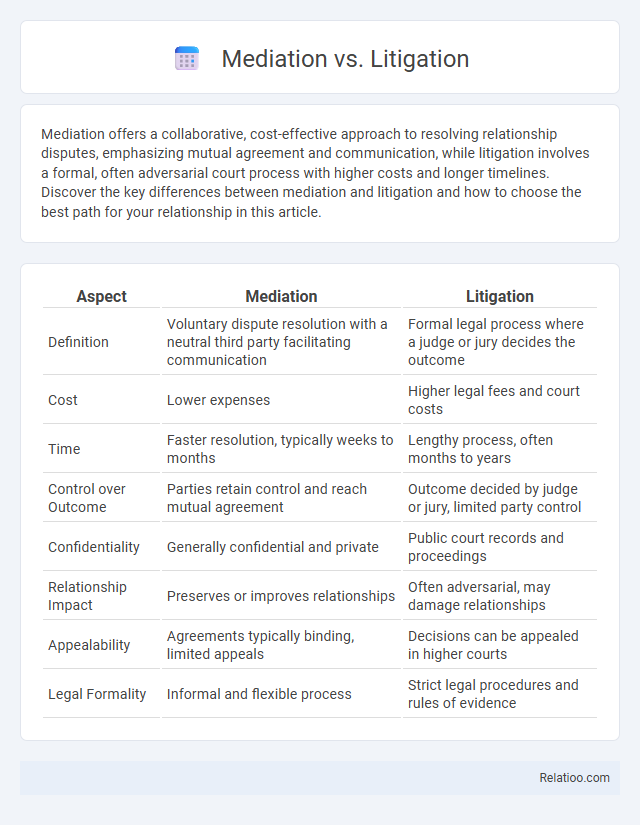Mediation offers a collaborative, cost-effective approach to resolving relationship disputes, emphasizing mutual agreement and communication, while litigation involves a formal, often adversarial court process with higher costs and longer timelines. Discover the key differences between mediation and litigation and how to choose the best path for your relationship in this article.
Table of Comparison
| Aspect | Mediation | Litigation |
|---|---|---|
| Definition | Voluntary dispute resolution with a neutral third party facilitating communication | Formal legal process where a judge or jury decides the outcome |
| Cost | Lower expenses | Higher legal fees and court costs |
| Time | Faster resolution, typically weeks to months | Lengthy process, often months to years |
| Control over Outcome | Parties retain control and reach mutual agreement | Outcome decided by judge or jury, limited party control |
| Confidentiality | Generally confidential and private | Public court records and proceedings |
| Relationship Impact | Preserves or improves relationships | Often adversarial, may damage relationships |
| Appealability | Agreements typically binding, limited appeals | Decisions can be appealed in higher courts |
| Legal Formality | Informal and flexible process | Strict legal procedures and rules of evidence |
Understanding Mediation and Litigation
Mediation involves a neutral third party facilitating negotiation between disputing parties to reach a voluntary agreement, emphasizing confidentiality and collaboration. Litigation is a formal legal process where disputes are resolved in court by a judge or jury, often resulting in a binding decision imposed by law. Understanding mediation and litigation highlights how mediation offers flexibility and cost-effectiveness, while litigation provides a structured, enforceable resolution through the judicial system.
Key Differences Between Mediation and Litigation
Mediation involves a neutral third party facilitating negotiated agreements, emphasizing confidentiality and collaboration to reach mutually beneficial outcomes without court involvement. Litigation is a formal judicial process where a judge or jury renders a binding decision based on legal evidence, often resulting in longer timelines and higher costs. Key differences include mediation's flexibility, reduced expenses, and non-binding resolutions versus litigation's structured procedures, enforceable judgments, and public record.
Benefits of Choosing Mediation
Choosing mediation over litigation offers significant benefits, including reduced costs and faster resolution times compared to protracted court battles. Mediation fosters a collaborative environment where parties maintain control over outcomes, promoting mutually satisfactory agreements and preserving relationships. Confidentiality in mediation ensures sensitive information remains private, unlike public litigation records.
Advantages of Litigation in Legal Disputes
Litigation offers the advantage of a formal, court-enforced resolution, providing a legally binding judgment that ensures enforceability. Your dispute is handled through a structured process with clear procedural rules, allowing for discovery, evidence presentation, and appeals if necessary. This legal certainty and public record can deliver finality and clarity unmatched by mediation or arbitration.
Cost Comparison: Mediation vs Litigation
Mediation costs are typically significantly lower than litigation expenses, as mediation involves fewer legal fees and shorter timeframes, reducing overall financial burdens. Litigation can incur high attorney fees, court costs, and extended timelines, making it a more expensive option compared to mediation. Your choice between mediation and litigation directly impacts the cost-efficiency of resolving disputes.
Time Efficiency in Mediation vs Litigation
Mediation significantly reduces the time required to resolve disputes compared to litigation, often concluding in weeks or months instead of the years associated with court cases. This time efficiency benefits your overall case management by minimizing delays and accelerating settlements through collaborative negotiation. Litigation typically involves prolonged procedural steps, making mediation a faster and more streamlined option for dispute resolution.
Confidentiality Considerations in Both Processes
Confidentiality plays a crucial role in both mediation and litigation, affecting how sensitive information is handled during dispute resolution. In mediation, the process is typically confidential, with communications and settlements kept private, encouraging open dialogue and preserving relationships without public exposure. Litigation, on the other hand, is generally a public court process where documents and testimonies can become part of the public record, potentially compromising your privacy and revealing strategic information.
Effectiveness for Different Types of Disputes
Mediation proves highly effective for resolving disputes that require confidentiality and preserving relationships, such as family or workplace conflicts, by fostering collaborative solutions. Litigation is more suitable for complex legal issues with substantial evidence and where enforceable judgments are critical, often seen in commercial or criminal cases. Arbitration offers a middle ground with faster resolution and binding decisions, making it ideal for contractual or business disputes needing expert evaluation.
When to Choose Mediation Over Litigation
You should choose mediation over litigation when seeking a faster, cost-effective resolution that maintains control over the outcome and preserves relationships. Mediation is ideal for disputes involving personal or business conflicts where confidentiality and collaboration are priorities, avoiding the public exposure common in litigation. This approach suits cases with willing parties aiming for mutually beneficial agreements without the risks and delays inherent in court trials.
Making the Right Choice: Mediation vs Litigation
Choosing between mediation and litigation depends on your priorities such as cost, time, and relationship preservation. Mediation offers a collaborative approach, promoting faster resolutions and minimizing expenses, while litigation involves formal court processes that can be lengthy, costly, and adversarial. Understanding the benefits of mediation for maintaining control and confidentiality helps you make an informed decision tailored to your unique dispute.

Infographic: Mediation vs Litigation
 relatioo.com
relatioo.com